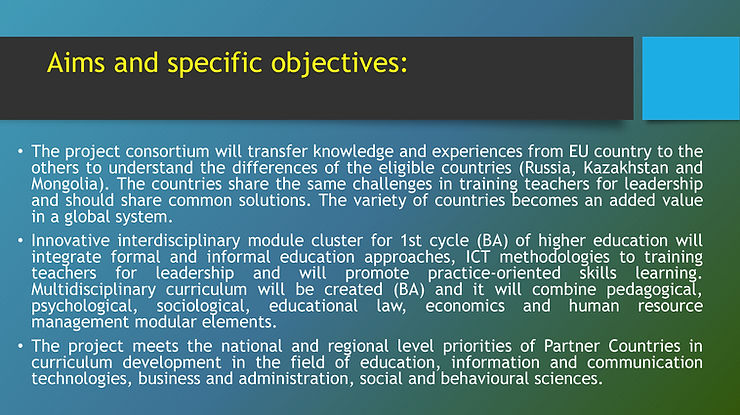
a.Y. 2025/2026

DeSTT - Development
of Skills and Teachers Training for Leadership

2019-2022

609905-EPP-1-2019-1-EPPKA2-CBHE-JP
The problem of training and professional development of local community leaders in formal and non-formal education has acquired importance in the Partner Countries due to the growing concern about the forms of citizen involvement in local democracy, about new tools for civil society public outreach. The project is of considerable relevance to meeting the national and regional level priorities of Partner Countries in teacher training and education science.
The project offers the complex system of local community leaders training by integrating formal and non-formal education with the help of a developed curriculum in the form of a modularized thematic cluster. The cluster combines pedagogical, sociological, psychological, law, economics, and management curriculum elements, necessary to make the process of training and professional development of local community leaders more effective, aimed at social interaction in an open civil society, at innovative behavior in a professional environment and local community. One of the main innovative elements is the Public E-lab, an indispensable part of the Centre for Non-formal Education of Local Community Leaders. The E-Lab serves as a platform for the design, development, and promotion of socially significant ideas of the local community, a model for the interaction and e-networking of active representatives of the local community. The E-lab carries out the training for would-be and active community leaders on the formation of virtual communication skills in blogs and forums, including virtual communication with representatives of local authorities, deputies.
The project will specify the competencies necessary for different groups of local leaders by analyzing the needs of the local community, by analyzing the range of competencies provided with existing curricula of formal and non-formal education. The deficient competencies will be formed through integrating formal and non-formal education and best practices of universities -members of the consortium. Integration of formal and non-formal education is capable of promoting practice-oriented skills learning which can significantly improve PC's education systems which are still too theoretical for addressing people’s real needs in regards to leadership.
Such integration can maximize local people’s participation levels in local self-government, make people more active in their everyday life.








